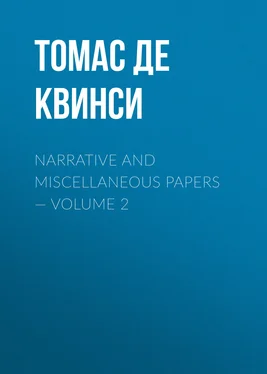Here we have a great European case of state omens in the eldest of Christian houses. The next which we shall cite is equally a state case, and carries its public verification along with itself. In the spring of 1799, when Napoleon was lying before Acre, he became anxious for news from Upper Egypt, whither he had despatched Dessaix in pursuit of a distinguished Mameluke leader. This was in the middle of May. Not many days after, a courier arrived with favorable despatches—favorable in the main, but reporting one tragical occurrence on a small scale that, to Napoleon, for a superstitious reason, outweighed the public prosperity. A djerme , or Nile boat of the largest class, having on board a large party of troops and of wounded men, together with most of a regimental band, had run ashore at the village of Benouth. No case could be more hopeless. The neighboring Arabs were of the Yambo tribe— of all Arabs the most ferocious. These Arabs and the Fellahs (whom, by the way, many of our countrymen are so ready to represent as friendly to the French and hostile to ourselves,) had taken the opportunity of attacking the vessel. The engagement was obstinate; but at length the inevitable catastrophe could be delayed no longer. The commander, an Italian named Morandi, was a brave man; any fate appeared better than that which awaited him from an enemy so malignant. He set fire to the powder magazine; the vessel blew up; Morandi perished in the Nile; and all of less nerve, who had previously reached the shore in safety, were put to death to the very last man, with cruelties the most detestable, by their inhuman enemies. For all this Napoleon cared little; but one solitary fact there was in the report which struck him with consternation. This ill-fated djerme —what was it called? It was called L'Italie ; and in the name of the vessel Napoleon read an augury of the fate which had befallen the Italian territory. Considered as a dependency of France, he felt certain that Italy was lost; and Napoleon was inconsolable. But what possible connection, it was asked, can exist between this vessel on the Nile and a remote peninsula of Southern Europe? 'No matter,' replied Napoleon; 'my presentiments never deceive me. You will see that all is ruined. I am satisfied that my Italy, my conquest, is lost to France!' So, indeed, it was. All European news had long been intercepted by the English cruisers; but immediately after the battle with the Vizier in July 1799, an English admiral first informed the French army of Egypt that Massena and others had lost all that Bonaparte had won in 1796. But it is a strange illustration of human blindness, that this very subject of Napoleon's lamentation—this very campaign of 1799—it was, with its blunders and its long equipage of disasters, that paved the way for his own elevation to the Consulship, just seven calendar months from the receipt of that Egyptian despatch; since most certainly, in the struggle of Brumaire 1799, doubtful and critical through every stage, it was the pointed contrast between his Italian campaigns and those of his successors which gave effect to Napoleon's pretensions with the political combatants, and which procured them a ratification amongst the people. The loss of Italy was essential to the full effect of Napoleon's previous conquest. That and the imbecile characters of Napoleon's chief military opponents were the true keys to the great revolution of Brumaire. The stone which he rejected became the keystone of the arch. So that, after all, he valued the omen falsely; though the very next news from Europe, courteously communicated by his English enemies, showed that he had interpreted its meaning rightly.
These omens, derived from names, are therefore common to the ancient and the modern world. But perhaps, in strict logic, they ought to have been classed as one subdivision or variety under a much larger head, viz. words generally, no matter whether proper names or appellatives, as operative powers and agencies, having, that is to say, a charmed power against some party concerned from the moment that they leave the lips.
Конец ознакомительного фрагмента.
Текст предоставлен ООО «ЛитРес».
Прочитайте эту книгу целиком, купив полную легальную версию на ЛитРес.
Безопасно оплатить книгу можно банковской картой Visa, MasterCard, Maestro, со счета мобильного телефона, с платежного терминала, в салоне МТС или Связной, через PayPal, WebMoney, Яндекс.Деньги, QIWI Кошелек, бонусными картами или другим удобным Вам способом.












